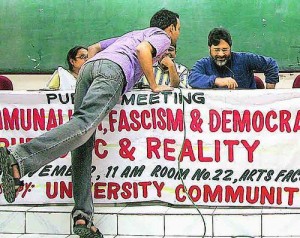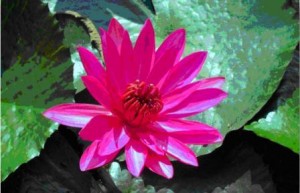अनिता भारती

दलित साहि्त्य के सशक्त हस्ताक्षर व वरिष्ठ लेखक ओमप्रकाश बाल्मीकि जी का आज सुबह परिनिर्वाण हो गया। वे पिछले एक साल से 'बड़ी आंत की गंभीर बीमारी' से जूझ रहे थे। उनका हिन्दी साहित्य और दलित साहित्य में उनके अवदान और उनकी लोकप्रियता का अंदाजा इसी बात से लगाया जा सकता है कि रोज उनसे मिलने वालों, फोन करने वालों और उनके स्वास्थ्य में शीघ्र सुधार होने की कामना करने वालों की संख्या हजारों में थी।
ओमप्रकाश बाल्मीकिजी पिछले एक सप्ताह से देहरादून के एक प्राईवेट अस्पताल मैक्स में दाखिल थे। उनके स्वास्थ्य की हालत चिंताजनक थी, इसके बाबजूद वह वे बहुत बहादुरी से अपनी बीमारी से लड़ रहे थे। पिछले साल 10 अगस्त 2013 में उनकी बडी आंत का सफल आपरेशन हुआ था। आपरेशन सफल होने के बाबजूद वे इससे उभर नहीं पाएं।
ओमप्रकाश बाल्मीकि उन शीर्ष लेखकों में से एक रहे है जिन्होने अपने आक्रामक तेवर से साहित्य में अपनी सम्मानित जगह बनाई है। वे बहुमुखी प्रतिभा के धनी थे। उन्होने कविता, कहानी, आ्त्मकथा से लेकर आलोचनात्मक लेखन भी किया है। अपनी आत्मकथा "जूठन" से उन्हें विशेष ख्याति मिली है। जूठन में उन्होने अपने और अपने समाज की दुख-पीडा-उत्पीडन-अत्याचार-अपमान का जिस सजीवता और सवेंदना से वर्णन किया वह अप्रतिम है। यह एक बहुत बडी उपलब्धी है कि आज जूठन का कई भाषाओं में अनुवाद हो चुका है. जूठन के अलावा उनकी प्रसिद्ध पुस्तकों में "सदियों का संताप", "बस! बहुत हो चुका" ( कविता संग्रह) तथा "सलाम" ( कहानी संग्रह ) दलित साहित्य का सौन्दर्य शास्त्र (आलोचना) आदि है। बाल्मीकि जी अब तक कई सम्मानों से नवाजे जा चुके है जिनमें प्रमुख रुप से 1993 में डॉ.अम्बेडकर राष्ट्रीय पुरस्कार तथा 1995 में परिवेश सम्मान है।
हिन्दी साहित्य और दलित साहित्य के शीर्ष साहित्यकार का अचानक असमय चले जाना बेहद दुखद है। वे मात्र अभी 63 साल के ही थे। वो अभी दो-तीन साल पहले ही देहरादून की आर्डनेंस फैक्ट्ररी से रिटायर हुए थे। उनका बचपन बहुत कष्ट-गरीब-अपमान में बीता। यही कष्ट-गरीबी और जातीय अपमान-पीडा और उत्पीडन उनके लेखन की प्रेरणा बने। उनकी कहानियों से लेकर आत्मकथा तक में ऐसे अऩेक मार्मिक चित्र और प्रसंगों का एक बहुत बड़ा कोलाज है। वह विचारों से अम्बेडकरवादी थे। बाल्मीकि जी हमेशा मानते थे कि दलित साहित्य में दलित ही दलित साहित्य लिख सकता है। क्योंकि उनका मानना था कि दलित ही दलित की पीडा़ और मर्म को बेहतर ढंग से समझ सकता है और वही उस अनुभव की प्रामाणिक अभिव्यक्ति कर सकता है। ओमप्रकाश बाल्मीकि जी के अचानक जाने से दलित साहित्य का एक स्तंम्भ ढह गया है. उनकी क्षति बेहद अपूर्णनीय है।

अनीता भारती जी ओम प्रकाश बाल्मिकीजी के साथ
~~
वाल्मीकि सर, आपसे अपनी चंद मुलाकातों से नहीं
आपकी स्मृति मेरे पुराने अल्हड दिनों से वाबस्ता है
जिनमे, मैंने
आपकी पंजाबी भाषा में अनुदित आत्मकथा
'जूठ' को जिया था
और तब कैसे मुझसे
अपने आप ही
इक खतरनाक अनुशासन छूट हो गया था
अन्दर से जैसे मैं बहुत सध गया था
और अपना सच भी तो
यही था/है कि अपने समाज के हस्बे हिसाब
शब्द केवल हर्फ़ नहीं होते
वो गोली भी होते हैं
अंगार भी
वो सैलाब भी होते हैं
पतवार भी
ये आन्दोलन के बीज तो हवाओं पर भी उग सकते हैं
और इनकी जड़ें
मिटटी को तरसा के
खुद, तना, पत्ते, फूल, फल बनने की
ज़िम्मेदारी उठा सकती है
लगभाग डेढ़ बरस पहले
जब दीनामणि 'इनसाइट' के दफ्तर आके
'खेत ठाकुर का अपना क्या रे' गीत की
खुद भी और मुझसे भी रिहर्सल करवा रहा था, तब
वही ताक़त मैं इस गीत को गाते हुए
जी रहा था!!
वाल्मीकि सर, आप ज़हन में हमेशा रहोगे
और ताक़त बन के रहोगे
मगर ज़हन में असरदराज़
भावनाओं के कोने
आपको बहुत टूट टूट कर याद करेंगे, सर !!!
~ गुरिंदर आज़ाद
~
ओम प्रकाश वाल्मीकि जी की कुछ चुनिंदा रचनाएं:
सदियों का संताप
दोस्तो !
बिता दिए हमने हज़ारों वर्ष
इस इंतज़ार में
कि भयानक त्रासदी का युग
अधबनी इमारत के मलबे में
दबा दिया जाएगा किसी दिन
ज़हरीले पंजों समेत.
फिर हम सब
एक जगह खडे होकर
हथेलियों पर उतार सकेंगे
एक-एक सूर्य
जो हमारी रक्त-शिराओं में
हज़ारों परमाणु-क्षमताओं की ऊर्जा
समाहित करके
धरती को अभिशाप से मुक्त कराएगा !
इसीलिए, हमने अपनी समूची घृणा को
पारदर्शी पत्तों में लपेटकर
ठूँठे वृक्ष की नंगी टहनियों पर
टाँग दिया है
ताकि आने वाले समय में
ताज़े लहू से महकती सड़कों पर
नंगे पाँव दौड़ते
सख़्त चेहरों वाले साँवले बच्चे
देख सकें
कर सकें प्यार
दुश्मनों के बच्चों में
अतीत की गहनतम पीड़ा को भूलकर
हमने अपनी उँगलियों के किनारों पर
दुःस्वप्न की आँच को
असंख्य बार सहा है
ताजा चुभी फाँस की तरह
और अपने ही घरों में
संकीर्ण पतली गलियों में
कुनमुनाती गंदगी से
टखनों तक सने पाँव में
सुना है
दहाड़ती आवाज़ों को
किसी चीख़ की मानिंद
जो हमारे हृदय से
मस्तिष्क तक का सफ़र तय करने में
थक कर सो गई है ।.
दोस्तो !
इस चीख़ को जगाकर पूछो
कि अभी और कितने दिन
इसी तरह गुमसुम रहकर
सदियों का संताप सहना है !
(जनवरी, 1989)
~
शंबूक का कटा सिर
जब भी मैंने
किसी घने वृक्ष की छाँव में बैठकर
घड़ी भर सुस्ता लेना चाहा
मेरे कानों में
भयानक चीत्कारें गूँजने लगी
जैसे हर एक टहनी पर
लटकी हो लाखों लाशें
ज़मीन पर पड़ा हो शंबूक का कटा सिर ।
मैं उठकर भागना चाहता हूँ
शंबूक का सिर मेरा रास्ता रोक लेता है
चीख़-चीख़कर कहता है–
युगों-युगों से पेड़ पर लटका हूँ
बार-बार राम ने मेरी हत्या की है ।
मेरे शब्द पंख कटे पक्षी की तरह
तड़प उठते हैं–
तुम अकेले नहीं मारे गए तपस्वी
यहाँ तो हर रोज़ मारे जाते हैं असंख्य लोग;
जिनकी सिसकियाँ घुटकर रह जाती है
अँधेरे की काली पर्तों में
यहाँ गली-गली में
राम है
शंबूक है
द्रोण है
एकलव्य है
फिर भी सब ख़ामोश हैं
कहीं कुछ है
जो बंद कमरों से उठते क्रंदन को
बाहर नहीं आने देता
कर देता है
रक्त से सनी उँगलियों को महिमा-मंडित ।
शंबूक ! तुम्हारा रक्त ज़मीन के अंदर
समा गया है जो किसी भी दिन
फूटकर बाहर आएगा
ज्वालामुखी बनकर !
(सितंबर 1988)
~
युग-चेतना
मैंने दुख झेले
सहे कष्ट पीढ़ी-दर-पीढ़ी इतने
फिर भी देख नहीं पाए तुम
मेरे उत्पीड़न को
इसलिए युग समूचा
लगता है पाखंडी मुझको ।
इतिहास यहाँ नकली है
मर्यादाएँ सब झूठी
हत्यारों की रक्तरंजित उँगलियों पर
जैसे चमक रही
सोने की नग जड़ी अँगूठियाँ ।
कितने सवाल खड़े हैं
कितनों के दोगे तुम उत्तर
मैं शोषित, पीड़ित हूँ
अंत नहीं मेरी पीड़ा का
जब तक तुम बैठे हो
काले नाग बने फन फैलाए
मेरी संपत्ति पर ।
मैं खटता खेतों में
फिर भी भूखा हूँ
निर्माता मैं महलों का
फिर भी निष्कासित हूँ
प्रताडित हूँ ।
इठलाते हो बलशाली बनकर
तुम मेरी शक्ति पर
फिर भी मैं दीन-हीन जर्जर हूँ
इसलिए युग समूचा
लगता है पाखंडी मुझको ।
(अक्टूबर 1988)
~
ठाकुर का कुआँ
चूल्हा मिट्टी का
मिट्टी तालाब की
तालाब ठाकुर का ।
भूख रोटी की
रोटी बाजरे की
बाजरा खेत का
खेत ठाकुर का ।
बैल ठाकुर का
हल ठाकुर का
हल की मूठ पर हथेली अपनी
फ़सल ठाकुर की ।
कुआँ ठाकुर का
पानी ठाकुर का
खेत-खलिहान ठाकुर के
गली-मुहल्ले ठाकुर के
फिर अपना क्या ?
गाँव ?
शहर ?
देश ?
(नवम्बर, 1981)
~
जूता
हिकारत भरे शब्द चुभते हैं
त्वचा में
सुई की नोक की तरह
जब वे कहते हैं–
साथ चलना है तो क़दम बढ़ाओ
जल्दी-जल्दी
जबकि मेरे लिए क़दम बढ़ाना
पहाड़ पर चढ़ने जैसा है
मेरे पाँव ज़ख़्मी हैं
और जूता काट रहा है
वे फिर कहते हैं–
साथ चलना है तो क़दम बढ़ाओ
हमारे पीछे-पीछे आओ
मैं कहता हूँ–
पाँव में तकलीफ़ है
चलना दुश्वार है मेरे लिए
जूता काट रहा है
वे चीख़ते हैं–
भाड़ में जाओ
तुम और तुम्हारा जूता
मैं कहना चाहता हूँ —
मैं भाड़ में नहीं
नरक में जीता हूँ
पल-पल मरता हूँ
जूता मुझे काटता है
उसका दर्द भी मैं ही जानता हूँ
तुम्हारी महानता मेरे लिए स्याह अँधेरा है ।
वे चमचमाती नक्काशीदार छड़ी से
धकिया कर मुझे
आगे बढ़ जाते हैं
उनका रौद्र रूप-
सौम्यता के आवरण में लिपट कर
दार्शनिक मुद्रा में बदल जाता है
और, मेरा आर्तनाद
सिसकियों में
मैं जानता हूँ
मेरा दर्द तुम्हारे लिए चींटी जैसा
और तुम्हारा अपना दर्द पहाड़ जैसा
इसीलिए, मेरे और तुम्हारे बीच
एक फ़ासला है
जिसे लम्बाई में नहीं
समय से नापा जाएगा।
~~~
(प्रख्यात कहानीकार, आलोचक और कवियत्री अनीता भारती दलित हिंदी साहित्य का एक मक़बूल नाम है। गुरिंदर आज़ाद हिंदी एवं पंजाबी भाषा में अपनी लेखनी से दलित आवाज़ बुलन्द करते रहे हैं. दिल्ली और आसपास के क्षेत्र में दलित युवाओं के बीच वे सक्रीय हैं।)



